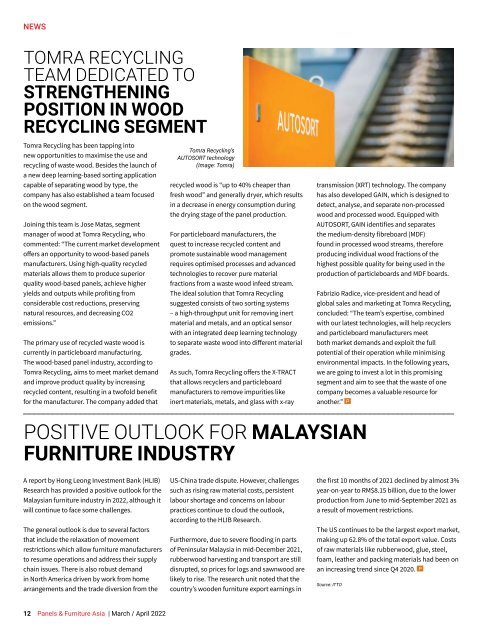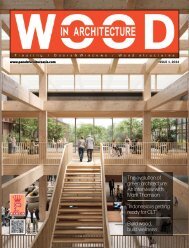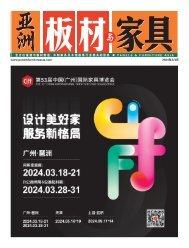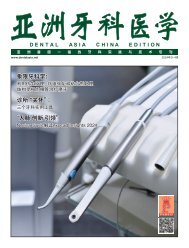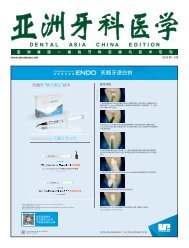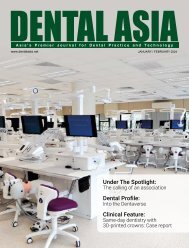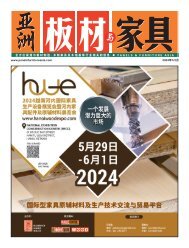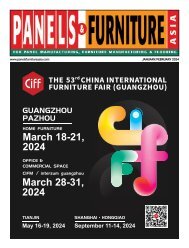Panels & Furniture March/April 2022
Panels & Furniture Asia (PFA) is a leading regional trade magazine dedicated to the woodbased panel, furniture and flooring processing industry. Published bi-monthly since 2000, PFA delivers authentic journalism to cover the latest news, technology, machinery, projects, products and trade events throughout the sector. With a hardcopy and digital readership comprising manufacturers, designers and specifiers, among others, PFA is the platform of choice for connecting brands across the global woodworking landscape.
Panels & Furniture Asia (PFA) is a leading regional trade magazine dedicated to the woodbased panel, furniture and flooring processing industry. Published bi-monthly since 2000, PFA delivers authentic journalism to cover the latest news, technology, machinery, projects, products and trade events throughout the sector. With a hardcopy and digital readership comprising manufacturers, designers and specifiers, among others, PFA is the platform of choice for connecting brands across the global woodworking landscape.
Create successful ePaper yourself
Turn your PDF publications into a flip-book with our unique Google optimized e-Paper software.
NEWS<br />
TOMRA RECYCLING<br />
TEAM DEDICATED TO<br />
STRENGTHENING<br />
POSITION IN WOOD<br />
RECYCLING SEGMENT<br />
Tomra Recycling has been tapping into<br />
new opportunities to maximise the use and<br />
recycling of waste wood. Besides the launch of<br />
a new deep learning-based sorting application<br />
capable of separating wood by type, the<br />
company has also established a team focused<br />
on the wood segment.<br />
Joining this team is Jose Matas, segment<br />
manager of wood at Tomra Recycling, who<br />
commented: “The current market development<br />
offers an opportunity to wood-based panels<br />
manufacturers. Using high-quality recycled<br />
materials allows them to produce superior<br />
quality wood-based panels, achieve higher<br />
yields and outputs while profiting from<br />
considerable cost reductions, preserving<br />
natural resources, and decreasing CO2<br />
emissions.”<br />
The primary use of recycled waste wood is<br />
currently in particleboard manufacturing.<br />
The wood-based panel industry, according to<br />
Tomra Recycling, aims to meet market demand<br />
and improve product quality by increasing<br />
recycled content, resulting in a twofold benefit<br />
for the manufacturer. The company added that<br />
Tomra Recycling’s<br />
AUTOSORT technology<br />
(Image: Tomra)<br />
recycled wood is “up to 40% cheaper than<br />
fresh wood” and generally dryer, which results<br />
in a decrease in energy consumption during<br />
the drying stage of the panel production.<br />
For particleboard manufacturers, the<br />
quest to increase recycled content and<br />
promote sustainable wood management<br />
requires optimised processes and advanced<br />
technologies to recover pure material<br />
fractions from a waste wood infeed stream.<br />
The ideal solution that Tomra Recycling<br />
suggested consists of two sorting systems<br />
– a high-throughput unit for removing inert<br />
material and metals, and an optical sensor<br />
with an integrated deep learning technology<br />
to separate waste wood into different material<br />
grades.<br />
As such, Tomra Recycling offers the X-TRACT<br />
that allows recyclers and particleboard<br />
manufacturers to remove impurities like<br />
inert materials, metals, and glass with x-ray<br />
transmission (XRT) technology. The company<br />
has also developed GAIN, which is designed to<br />
detect, analyse, and separate non-processed<br />
wood and processed wood. Equipped with<br />
AUTOSORT, GAIN identifies and separates<br />
the medium-density fibreboard (MDF)<br />
found in processed wood streams, therefore<br />
producing individual wood fractions of the<br />
highest possible quality for being used in the<br />
production of particleboards and MDF boards.<br />
Fabrizio Radice, vice-president and head of<br />
global sales and marketing at Tomra Recycling,<br />
concluded: “The team’s expertise, combined<br />
with our latest technologies, will help recyclers<br />
and particleboard manufacturers meet<br />
both market demands and exploit the full<br />
potential of their operation while minimising<br />
environmental impacts. In the following years,<br />
we are going to invest a lot in this promising<br />
segment and aim to see that the waste of one<br />
company becomes a valuable resource for<br />
another.” P<br />
POSITIVE OUTLOOK FOR MALAYSIAN<br />
FURNITURE INDUSTRY<br />
A report by Hong Leong Investment Bank (HLIB)<br />
Research has provided a positive outlook for the<br />
Malaysian furniture industry in <strong>2022</strong>, although it<br />
will continue to face some challenges.<br />
The general outlook is due to several factors<br />
that include the relaxation of movement<br />
restrictions which allow furniture manufacturers<br />
to resume operations and address their supply<br />
chain issues. There is also robust demand<br />
in North America driven by work from home<br />
arrangements and the trade diversion from the<br />
US-China trade dispute. However, challenges<br />
such as rising raw material costs, persistent<br />
labour shortage and concerns on labour<br />
practices continue to cloud the outlook,<br />
according to the HLIB Research.<br />
Furthermore, due to severe flooding in parts<br />
of Peninsular Malaysia in mid-December 2021,<br />
rubberwood harvesting and transport are still<br />
disrupted, so prices for logs and sawnwood are<br />
likely to rise. The research unit noted that the<br />
country’s wooden furniture export earnings in<br />
the first 10 months of 2021 declined by almost 3%<br />
year-on-year to RM$8.15 billion, due to the lower<br />
production from June to mid-September 2021 as<br />
a result of movement restrictions.<br />
The US continues to be the largest export market,<br />
making up 62.8% of the total export value. Costs<br />
of raw materials like rubberwood, glue, steel,<br />
foam, leather and packing materials had been on<br />
an increasing trend since Q4 2020. P<br />
Source: ITTO<br />
12 <strong>Panels</strong> & <strong>Furniture</strong> Asia | <strong>March</strong> / <strong>April</strong> <strong>2022</strong>


